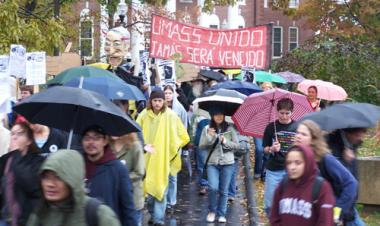More than 1,000 students and workers at UMass Amherst marched across campus Nov. 15 through pouring rain and occupied the large building that houses the offices of top UMass officials. They danced in the streets to music from drums and trumpets. Others carried banners and giant puppets. March leaders sang, "What do we want?" A thousand voices cried out, "Justice!"
The protesters had four demands:
- Reduce student fees
- Increase diversity on campus
- End routine police patrols of dorms
- Return the Student Union/ Campus Center building, which was built with money from student fees, to student control.
For in-state undergrads, the total cost of a year at UMass, including tuition, fees and room and board rose from $10,822 in 2001 to $17,399 this year. In-state graduate student fees have gone from $4,113 to $7,455 in the past five years.
All the approximately 30 students admitted to the graduate history program at UMass last year were white.
A Nov. 16 article in the Boston Globe about the strike printed without question a claim by UMass officials that the student body at Amherst accurately reflects the percentage of people of color in the state. But according to the Census Bureau, the population of Massachusetts is 7 percent African American and 8 percent Latino. At UMass Amherst, African Americans account for 4 percent of the grad student population. Latinos account for 3 percent of the grad student population.
Massachusetts law prohibits public employees from striking. So none of the labor unions on campus were able to officially endorse the "strike," as the two-day protest was called by the groups that organized it, the Student Government Association (whose officials are elected by the 20,000 undergrads at UMass Amherst) and the Graduate Student Senate (whose officials are elected by the 6,000 grad students at Amherst).
Following a call by the faculty union to support the students' demands, within a few days 165 professors had signed pledge cards promising not to retaliate against students or grad student workers who missed class to attend the protests.
In the interests of full disclosure, I am a graduate student employee at UMass Amherst. I'm a volunteer shop steward for the Graduate Employee Organization (GEO), the union that represents the 2,500 graduate employees at UMass Amherst. GEO pays me for about two hours per week for my work on the union's contract bargaining committee, an elected position. GEO is a subsidiary of United Auto Workers Local 2322 in Holyoke.
GEO has been bargaining with UMass since January over diversity, fees, and other issues. GEO members have been working without a contract since September.
After they pay their UMass fees, GEO members earn about $13,000 a year for 20 hours of work a week. Workers doing the same jobs at Rutgers get $19,000 for 15 hours a week with no fees. The University of Connecticut pays $18,000. The chances that grad students, especially ones in fields like history and English, will ever become professors have been plummeting in recent decades. A student who earns a Ph.D. in history (which takes about seven years after an undergrad degree) now has a 20-percent chance of ever landing a job as a full-time professor.
Student leaders last week asked supporters to contact Governor Deval Patrick and ask him to direct UMass to agree to the students' demands and accept GEO's contract proposals.



